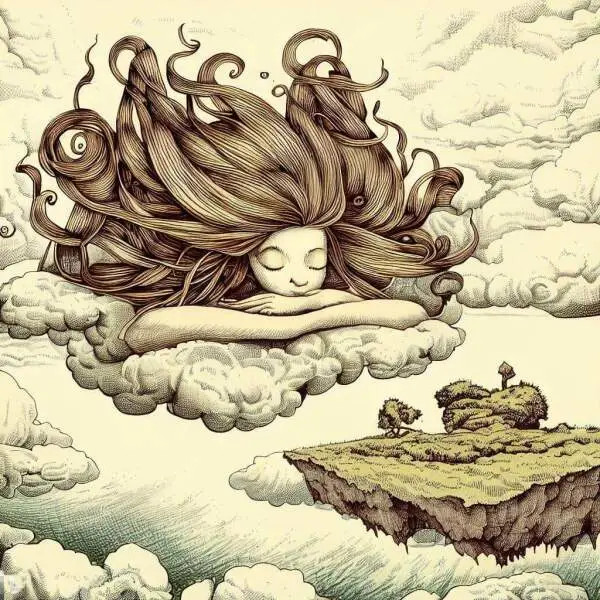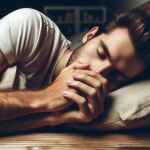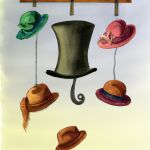I solved my sleep problem in 3 months: let me tell you how
This is my experience of how I was able to solve my sleep problems. I suffered from them for 4 long years, but I resolved them in 3 months and I'm going to explain how I did it....
Table of Contents
- My symptoms of having fragmented sleep
- The solution of the neurologist and psychologist
- Who really helped me
- I began to realize where my sleep problem was coming from
- How I Started Fighting Anxiety
- I stopped taking clonazepam
- Sleep problems can have multiple causes
- What do I do exactly to sleep well
Follow Patricia Alegsa on Pinterest!
I woke up tired, during the day I felt like sleeping a lot, with little desire to do my activities, and even had inexplicable body pains and a kind of "mental fog."
I had this problem for 4 long years (around my 34 years I started with this issue), but it worsened even more in the last year. I even started to feel physical pain. I never realized I had a sleep problem.
First, I went to the hematologist, then to the infectious disease specialist, I also went through the neurologist and the psychiatrist (who prescribed clonazepam for me). I even went to two rheumatologists, assuming I had some rheumatic disease, one of those that are difficult to diagnose.
They were 4 very long, tedious years, where I underwent all kinds of tests and medical exams...
At first, I didn't realize the problem was lack of sleep (I slept between 6 and 7 hours a day, something considered normal in these times), but a sleep study indicated that I had "fragmented sleep." This means that I would wake up slightly during the night, but wouldn't remember it.
My symptoms of having fragmented sleep
As I said, at first I didn't realize I had fragmented sleep. I would just wake up feeling half-tired, with mental gaps, feeling fatigued. After working out, my body and joints would ache the next day.
This past year, I've also been more nervous and anxious than usual, and my sleep kept getting worse. Now, I also found myself waking up very early, around 3 or 4 am; sometimes I'd go back to sleep, sometimes I wouldn't.
As mentioned before, the sleep study revealed I had fragmented sleep, the challenge was to uncover the reason why.
The solution of the neurologist and psychologist
The "magical" solution from the neurologist and psychologist was to try clonazepam, a well-known anxiolytic: it helped reduce the anxiety. I had already tried melatonin with good results, but over time it stopped working for me.
Clonazepam helped me a lot, I must admit. I took it for 8 months and the problem had disappeared. I took it a while before going to bed, with very good results: I slept better, no longer had body pains the next day.
The issue? It left me feeling a bit groggy the next day, sometimes with mental gaps and my libido (sexual desire) was really low.
Besides, I didn't want to depend on taking clonazepam for the rest of my life, I had to do something else... At least this gave me a clue: anxiety could be the trigger for poor sleep.
Besides, I didn't want to depend on taking clonazepam for the rest of my life, I had to do something else... At least this gave me a clue: anxiety could be the trigger for poor sleep.
Who really helped me
I started behavioral therapy with the psychologist: it produced a substantial change in my life and in the way I see things...
In the first session with the psychologist, I told her that I had traveled to a beautiful beach in Brazil, but I clarified that I couldn't rest well even there. Then, she asked me a question that shook me: "Do you remember the smell of the sea?".
My answer was "No". To understand what this means: I went to a beautiful beach by the sea in Brazil, but I didn't remember having felt the smell of the sea.
What did this mean? That I was on a beach in Brazil, but I was not mentally there when I went.
This clicked something in my head, maybe the solution was here... but many surprises still awaited me.
Then, as good behavioral therapy (they are very practical, they don't delve too much into your past, they go straight to the problem that afflicts you), she proposed that I start writing down the most outstanding things of my day every day: colors, sensations, textures, smells, thoughts, etc.
I had to achieve "being more present with the senses" while doing daily tasks. That is, pay more attention to what I was doing, as a way to stop thinking so much about the past or the future: focus on the present.
I have this article where I especially talk about "being present" that I suggest you schedule to read later:
How to overcome the fear of the future: the power of the present
I have this article where I especially talk about "being present" that I suggest you schedule to read later:
How to overcome the fear of the future: the power of the present
I began to realize where my sleep problem was coming from
Anxiety, repetitive thoughts, nervousness, "thumps" in the heart (medically called extrasystoles).
I began to notice that I had all of that, but I never imagined that it could affect my sleep so much. They didn't seem so serious.
With behavioral therapy, I changed the way I face that anxiety about the future and those damn repetitive thoughts from the past. It helped me a lot to confront those "fears" that are often only in our heads.
I began to notice that I had all of that, but I never imagined that it could affect my sleep so much. They didn't seem so serious.
With behavioral therapy, I changed the way I face that anxiety about the future and those damn repetitive thoughts from the past. It helped me a lot to confront those "fears" that are often only in our heads.
I started to open up more with my friends and acquaintances, telling them about my sleep problems, about how I was facing them. It's incredible how talking to people not only reinforces the therapy, but people also open up more and tell you about their problems, how they solved or faced them. The feedback that occurs is really very good and I recommend it to you.
If you are afraid of or averse to psychological therapy, I suggest you read this article I wrote:
Myths you must debunk about therapy
If you are afraid of or averse to psychological therapy, I suggest you read this article I wrote:
Myths you must debunk about therapy
How I Started Fighting Anxiety
While in therapy, I also had moments of high anxiety that I couldn't calm down. So I came up with "breathing" more slowly. Taking a 5-second inhale and an 8-second exhale.
I did it about 3 or 4 times and noticed how the anxiety either extinguished or at least decreased. I discovered that with breathing, I could calm down a lot of anxiety and mysterious nervousness.
I searched for podcasts and songs on Spotify related to "mindfulness." There is a lot of material there that allows me to relax when I need it. For example, before going to bed, after waking up. Even if I have a thought in the afternoon that makes me nervous, I play one of these audio tracks that relax me.
So, what have I discovered so far:
I did it about 3 or 4 times and noticed how the anxiety either extinguished or at least decreased. I discovered that with breathing, I could calm down a lot of anxiety and mysterious nervousness.
I searched for podcasts and songs on Spotify related to "mindfulness." There is a lot of material there that allows me to relax when I need it. For example, before going to bed, after waking up. Even if I have a thought in the afternoon that makes me nervous, I play one of these audio tracks that relax me.
So, what have I discovered so far:
- That I am anxious
- That behavioral therapy helps me
- That breathing and mindfulness calm me
So, what could I do to make all of this become part of my life? Is there any activity that allows me to relax like this?
I also discovered power yoga: a slightly more intense yoga than usual. I am a person who trains a lot at the gym, maybe for other people, just yoga is ideal.
So, what could I do to make all of this become part of my life? Is there any activity that allows me to relax like this?
I also discovered power yoga: a slightly more intense yoga than usual. I am a person who trains a lot at the gym, maybe for other people, just yoga is ideal.
With yoga, twice a week, I learned many more relaxation techniques, more ways to "be present" and not think so much about the future. I really recommend it.
You can read more about combating anxiety in these articles that I recommend you to bookmark:
Effective techniques to overcome anxiety and lack of focus
You can read more about combating anxiety in these articles that I recommend you to bookmark:
Effective techniques to overcome anxiety and lack of focus
I stopped taking clonazepam
I was able to quit clonazepam (something I had tried twice before and couldn't). Of course, after 8 months of taking it, those first nights were a bit tough, but it wasn't so bad.
I imagine that if you have been taking clonazepam or another medication for a long time, the ideal thing is to gradually stop it, as indicated by your personal doctor.
Was my sleep perfect? Not yet.
If I had to rate my sleep, I think it went from "bad" to "good", but it still wasn't "very good" or "excellent". I had nights where I slept much better than others, I couldn't quite understand why this was happening.
Was my sleep perfect? Not yet.
If I had to rate my sleep, I think it went from "bad" to "good", but it still wasn't "very good" or "excellent". I had nights where I slept much better than others, I couldn't quite understand why this was happening.
Sleep problems can have multiple causes
So now that I am calmer and more relaxed. I know how to calm myself down with yoga, music, and breathing. My sleep has improved a lot.
Which led me to wonder: Why are there still nights when I sleep poorly? If yesterday I slept perfectly, why not today, if nothing has changed from yesterday to today?
Well, basically, let me summarize it for you: sleep problems can have different causes. The issue is that you could be experiencing several causes at once, you could solve one of the causes, but the others still persist.
Which led me to wonder: Why are there still nights when I sleep poorly? If yesterday I slept perfectly, why not today, if nothing has changed from yesterday to today?
Well, basically, let me summarize it for you: sleep problems can have different causes. The issue is that you could be experiencing several causes at once, you could solve one of the causes, but the others still persist.
This is more specific, each person may have different reasons that prevent them from sleeping well. In my case, anxiety was the main factor, but not the only one.
The psychologist told me to start writing down what I did each day, what I did differently, what time I went to bed, what time I woke up, roughly what activities I did during the day, what thoughts I had, what feelings those thoughts produced in me, etc.
I found another cause (at least in me) of my poor sleep: my lactose intolerance.
Drinking a little milk, in general, doesn't bother me. But I never imagined that, even if it doesn't bother me, this would be another cause of my sleep problems.
It seems that if one drinks milk and is lactose intolerant, even if it's very little, it produces stress in the body, which generates cortisol and ultimately, makes you wake up or sleep poorly.
Therefore, I eliminated milk from my diet. If I have to eat something that has a little milk, I take one or two lactase enzyme pills beforehand (this breaks down the lactose you are consuming, so, in this way, it won't bother you).
I encourage you to also discover what the hidden cause of your sleep problems may be. It's not easy, it requires paying a lot of attention, doing a lot of research, not ruling anything out.
As I believe this is a topic that requires better treatment and reliable scientific sources, I wrote this article on this subject that will answer many of your doubts:The relationship between sleeping poorly and lactose intolerance
This is my (non-exhaustive) list of everything I do to sleep well, of course, it is an open list. Later on, I might discover some other trigger of my sleep problem or other techniques to sleep better and I will update this list:
* I don't let any light enter the room where I sleep (not even the TV's LED light turned on).
* I leave a fan on or a speaker with a background noise: any external noise wakes me up, better not to hear them.
* I try to go to sleep at the same time every night.
* I don't use screen devices one hour before bedtime: sometimes I don't follow this rule. In my case, it doesn't affect me much, but the screen light may affect some people more.
* I don't eat heavy meals before bed, nor do I drink too much water to avoid waking up in the middle of the night to go to the bathroom.
* I avoid milk and any other food that could cause a lot of intestinal "movement".
* I play a mindfulness audio to fall asleep (I made a Spotify list with my favorites). I set it to turn off automatically after 45 minutes.
I will update this article over time because this is just a brief summary of my life in the past few months. I probably have to write several more detailed articles on how I solved my sleep problems in 3 months, I have a lot more to say.
Therefore, I eliminated milk from my diet. If I have to eat something that has a little milk, I take one or two lactase enzyme pills beforehand (this breaks down the lactose you are consuming, so, in this way, it won't bother you).
I encourage you to also discover what the hidden cause of your sleep problems may be. It's not easy, it requires paying a lot of attention, doing a lot of research, not ruling anything out.
As I believe this is a topic that requires better treatment and reliable scientific sources, I wrote this article on this subject that will answer many of your doubts:The relationship between sleeping poorly and lactose intolerance
What do I do exactly to sleep well
This is my (non-exhaustive) list of everything I do to sleep well, of course, it is an open list. Later on, I might discover some other trigger of my sleep problem or other techniques to sleep better and I will update this list:
* I don't let any light enter the room where I sleep (not even the TV's LED light turned on).
* I leave a fan on or a speaker with a background noise: any external noise wakes me up, better not to hear them.
* I try to go to sleep at the same time every night.
* I don't use screen devices one hour before bedtime: sometimes I don't follow this rule. In my case, it doesn't affect me much, but the screen light may affect some people more.
* I don't eat heavy meals before bed, nor do I drink too much water to avoid waking up in the middle of the night to go to the bathroom.
* I avoid milk and any other food that could cause a lot of intestinal "movement".
* I play a mindfulness audio to fall asleep (I made a Spotify list with my favorites). I set it to turn off automatically after 45 minutes.
I also suggest you schedule to read this other article that will help you a lot: Methods for anti-stress in modern life
It goes without saying that I do sports 4 or 5 times a week, eat well, and lead a healthy life.
It is also important to go out more, meet with friends and family. Return to a more "normal" life, adjusting your schedules. Because when we sleep poorly, we start not wanting to go out, we meet with friends less and less...
I encourage you to seek help when you are having sleep problems or any other issue. Medications should be the last resort, never the first:
Remember this: sleeping pills only mask the problems you are having, they do not solve them.
It goes without saying that I do sports 4 or 5 times a week, eat well, and lead a healthy life.
It is also important to go out more, meet with friends and family. Return to a more "normal" life, adjusting your schedules. Because when we sleep poorly, we start not wanting to go out, we meet with friends less and less...
I encourage you to seek help when you are having sleep problems or any other issue. Medications should be the last resort, never the first:
Remember this: sleeping pills only mask the problems you are having, they do not solve them.
I will update this article over time because this is just a brief summary of my life in the past few months. I probably have to write several more detailed articles on how I solved my sleep problems in 3 months, I have a lot more to say.
I will surely have days when I sleep poorly, many others when I sleep well. The important thing is that now I have multiple natural tools that I know help me improve my quality of life in general and my sleep in particular. That is essential, having tools and knowing how to use them.
At this moment, I can rate my sleep between "good" and "very good". I hope that in a few months I can change this and say that my sleep is now "excellent".
At this moment, I can rate my sleep between "good" and "very good". I hope that in a few months I can change this and say that my sleep is now "excellent".
You can continue reading this related article that will help you sleep better and be happier in your life: Inhale the good, exhale the bad
Subscribe to the free weekly horoscope
Aquarius Aries Cancer Capricorn Gemini Leo Libra Pisces Sagittarius Scorpio Taurus Virgo
-
 You should avoid covering your mouth while sleeping
You should avoid covering your mouth while sleeping
In English, it is called mouth taping: a viral method that encourages breathing through the nose by taping the mouth shut. Why you should avoid it. -
 What does it mean to dream of kites?
What does it mean to dream of kites?
Discover the mysterious meaning behind dreaming of comets - is it a harbinger of success or a drastic change in your life? Read our article to find out more! -
 The Most Beautiful Yet Dangerous Plants for Your Home and Pets
The Most Beautiful Yet Dangerous Plants for Your Home and Pets
Discover the most beautiful yet dangerous plants for your home. Learn about their toxins and what to do in case of poisoning to protect your family and pets. -
 What does it mean to dream of bombs?
What does it mean to dream of bombs?
Discover the meaning of dreaming about bombs and their relation to your emotions and decisions, don't miss this complete guide to interpret your dreams! -
 What does it mean to dream of streetcars?
What does it mean to dream of streetcars?
Discover the meaning behind your dreams with streetcars. What message is your subconscious sending you? Learn more in our article.
ALEGSA AI
-
Good choice. Once again, I wake up at 2 a.m. and can't fall back asleep until around 4. I think either the stress is high or these insomnia episodes are related to some health issue. For a month now, I've been feeling numbness in my little finger on my left hand. What do you think?
Hello! ? I'm sorry to hear that you're going through such a difficult time. Lack of sleep and numbness in your finger are things that can cause concern, so I understand your worries.
Regarding sleep, waking up frequently in the middle of the night can be related to stress, anxiety, or even improper sleep habits. ? You might have thoughts that are troubling you or a busy daily routine that makes you feel overwhelmed. It would be helpful to try some relaxation techniques before bed, such as meditation, reading, or breathing exercises.
As for the numbness in your little finger, there could be various causes, including circulation issues or pressure on the nerves. ? It's important not to ignore this symptom! I advise you to consult a doctor to discuss these symptoms and rule out any serious medical issues.
In the meantime, try to find ways to reduce stress in your life. Engaging in enjoyable activities or hobbies that bring you joy can be helpful. If you'd like, I can offer specific relaxation techniques or lifestyle suggestions that might help. How do you feel about this? ?✨
I am Patricia Alegsa
I have been writing horoscope and self-help articles professionally for over 20 years.
Subscribe to the free weekly horoscope
Receive weekly in your email the horoscope and our new articles on love, family, work, dreams and more news. We do NOT send spam.
Astral and numerological analysis
-
 Discover your future, secret personality traits and how to improve in love, business and life in general
Discover your future, secret personality traits and how to improve in love, business and life in general
-
 Online Dream Interpreter: with artificial intelligence
Do you want to know what a dream you had means? Discover the power of understanding your dreams with our advanced online dream interpreter using artificial intelligence that responds to you in seconds.
Online Dream Interpreter: with artificial intelligence
Do you want to know what a dream you had means? Discover the power of understanding your dreams with our advanced online dream interpreter using artificial intelligence that responds to you in seconds.
-
 What does it mean to dream of cherry fruits?
What does it mean to dream of cherry fruits?
Discover the meaning of dreaming of cherry fruits: is it an omen of love, or does it symbolize economic prosperity? Find out everything in our article! -
 Alarm: Cancer in Young Adults and Women Dramatically Increases
Alarm: Cancer in Young Adults and Women Dramatically Increases
Attention! Cancer is no longer just an issue for older people: it is growing among young people and women. Incredible but true! The reality is changing. -
 What does it mean to dream of hawks?
What does it mean to dream of hawks?
Have you ever wondered what it means to dream of hawks? Discover in our article the symbolism of these majestic animals and their interpretation in your dreams. -
 Discover your personality according to the seat you choose: Dare to get to know yourself!
Discover your personality according to the seat you choose: Dare to get to know yourself!
What does your choice of seat say about your personality? From the hard plastic chair to the most comfortable bean bag, discover the 11 types of seats and what they reveal about you. Take the test and be surprised! -
 The toxic person you should distance yourself from, according to your zodiac sign
The toxic person you should distance yourself from, according to your zodiac sign
This is the toxic person you should stay away from to improve your life, according to your zodiac sign. -
 What does it mean to dream of a divorce?
What does it mean to dream of a divorce?
Discover the meaning behind your dreams with this article on What does it mean to dream of divorce? Learn how to interpret your dreams and take control of your love life. -
 What does it mean to dream of skeletons?
What does it mean to dream of skeletons?
Discover the hidden meaning behind your dreams with skeletons. Learn about their symbolism and how they can affect your daily life in this complete article. -
 Strange discovery on Mars, a rock that surprises NASA
Strange discovery on Mars, a rock that surprises NASA
A strange finding on Mars: Perseverance discovers a rock with zebra markings, sparking the interest of scientists and new theories in the Jezero crater. -
 What does it mean to dream of hats?
What does it mean to dream of hats?
Discover the fascinating world of dreams with hats. This article will guide you in interpreting your dreams and give you valuable insights to improve your life. -
 What does it mean to dream of skyscrapers?
What does it mean to dream of skyscrapers?
Discover the mysterious meaning of dreaming about skyscrapers in this interesting article. What message do your dreams send you about these imposing buildings? Find out here. -
 What does it mean to dream of natural disasters?
What does it mean to dream of natural disasters?
Discover the meaning behind your dreams with natural disasters in our article: Find out what your subconscious is telling you! -
 What does it mean to dream of oceans?
What does it mean to dream of oceans?
Discover the meaning of dreaming of oceans and enter a world of interpretations: what is your subconscious telling you? Read more here! -
 The biggest scandals of the year of international celebrities
The biggest scandals of the year of international celebrities
The year of celebrities! Cancer, scandals, and comebacks. Paris Match narrates diagnoses, allegations, and returns that shook and showcased their resilience.